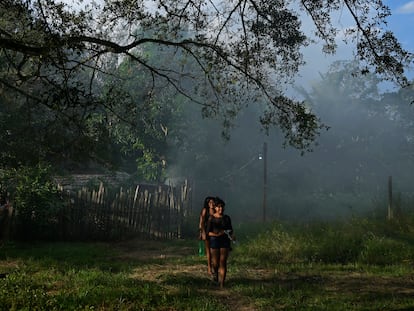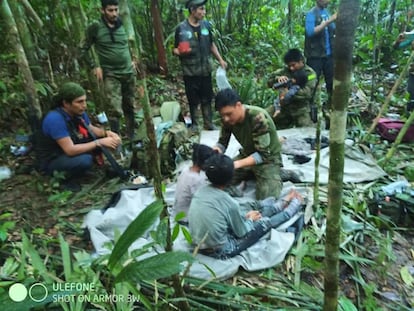‘The children wouldn’t have survived another week in the jungle’
Pedro Sánchez, the special forces general who led the search, never lost hope of finding them alive in the Amazon
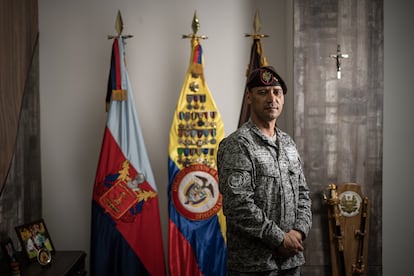

Pedro Sánchez isn’t exactly Rambo – he doesn’t fit the prototype of a special forces general. Sánchez is of average height and stocky build, with a face scarred by teenage acne. During our interview, he excuses himself once to go to the bathroom and shed a few tears for his deceased parents, returning with red eyes. There’s a book about socialism on his shelf. He issues orders calmly to the subordinates who constantly interrupt our conversation. Sánchez frequently listened to flamenco pop music while he led the search for the lost children. He poured out cane liquor over the Amazon as they flew overhead looking for the children. The Indigenous guides who aided the search said it was an offering to the mother jungle for the safe return of the four siblings. After 40 days, Lesly, Soleiny, Tien and Cristin were finally found. EL PAÍS interviewed General Pedro Sánchez in his office at the military barracks in northern Bogotá to find out how those children survived in an environment so full of life, yet so dangerous.
Question: When were you assigned to lead the search for the children?
Answer. We were in the midst of planning other special operations in Bogotá when the airplane crashed on May 1. My initial hopes were that the occupants were alive and would soon be located through radio beacons and other means. Four days passed with no success, so I began to realize that they might request our assistance. My command of this unit was the reason I got the job, not because I was the most qualified. General Giraldo, who is in charge of the Armed Forces, asked me to lead the effort.
Q. And then he called the president?
A. I have no idea.
Q. You had to go to the command post in San José del Guaviare, near the jungle.
A. The president’s concern was warranted – an aircraft carrying Indigenous people and four minors was in trouble. I spoke to the Air Force Commander and offered to help. We knew it would be tricky, but our elite forces are trained for just this kind of mission, even if it falls outside of our usual scope. We’re a team that doesn’t shy away from a challenge. After receiving permission from General Giraldo, we deployed a unit on May 5. We canceled an ongoing operation I was overseeing in Medellín and focused on the missing plane. The next day, we were on the ground in San José, with a mission not just to locate the missing aircraft, but to assess the risks in the area. The terrain is manageable, but the narco-criminal groups operating there are a big problem.
Q. But there is a bilateral ceasefire with the FARC [guerrilla] dissidents...
A. Yes, but my men know that when they encounter a threat, they have to act. Hesitation means death.
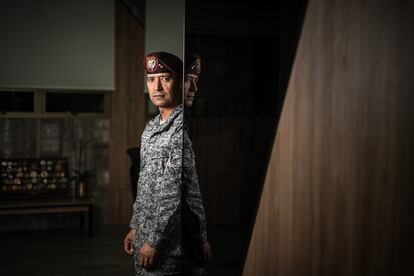
Q. How is it that the children were found just five kilometers [3 miles] from the plane?
A. They got disoriented after walking about 24 kilometers [15 miles]. It’s difficult to navigate there and they just happened to circle back to the site.
Q. How do you know they walked 24 kilometers?
A. Based on the evidence we found. [Sánchez shows us a map of the children’s estimated route that shows them reaching a certain point and then backtracking].
Q. Have you discussed this with the children?
A. No, this is what we’ve deduced. We haven’t talked to them. We need the children’s input to complete the story.
Q. What was Lesly’s role in keeping her siblings alive?
A. She was the leader – what she did was crucial. First, she never lost her will to live and secondly, she was very resourceful.
Q. For example?
A. It’s best to wait for the full story. What I’m telling you is simply conjecture and deduction. For example, she’d lost her scissors, but ingeniously cut branches for shelter using only her teeth. When they ran out of food, she chewed up fruit and fed it to the baby. She also salvaged things from the plane wreckage to help them survive.
Q. Like what?
A. Fariña [a coarse flour made from yucca], clothes, a mosquito net and everything in the first-aid kit. She also changed the baby’s diapers.
Q. Where did she get diapers?
A. They had them on the plane. We found three discarded diapers in different places.
Q. What do you think about the theory that they kept quiet out of fear when they heard you nearby?
A. I can only tell you that we passed within 40 meters [130 feet] of them once. And they heard us. Both the soldiers and the Indigenous guides. And Lesly heard the helicopter and the loudspeakers. But I don’t know why she didn’t help us locate her. She’s the only one who knows that. In the jungle, you can get lost by wandering just 20 meters [65 feet] away.
Q. Why did you personally go to the jungle?.
A. I had three reasons for going. First, to ensure the mission was on track. Second, to raise troop morale by assuring them that we would succeed. Lastly, to have peace in my own mind that even if we found them dead, we could say that we didn’t give up looking.
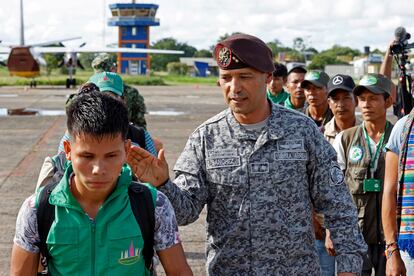
Q. How many times were you on the ground there?
A. Only once, two days before finding them. I arrived on Wednesday, June 7. The Indigenous guides suggested that I go and ask the jungle for the children. I wanted to build trust with them, so I went and the first thing we did was pray, “Oh, mother jungle, allow these humble mortals to find these children and bring them home soon.” Then I joined the search party in the jungle and stayed there overnight. I saw firsthand how difficult it was. I saw the perseverance of the Indigenous guides but also their helplessness. My men had been there for 30 days, so I ordered other troops to come and relieve them.
Q. You offered whiskey and cane liquor to the jungle.
A. I sent for some whiskey, but the Indigenous people told me it wasn’t necessary.
Q. Why?
A. Because the spirit accepts moonshine – the cane liquor. There are many theories about that. All I can tell you is that I had to balance military science with Indigenous beliefs. And in that balance, we had to give them confidence and show them that what they say matters. Are you Catholic?
Q. No.
A. Well, for them, Our Lady of Fatima [the apparition of the Virgin Mary in Fatima, Portugal] might be a fairy tale. Who’s right? I don’t know. All I know is that I had to respect them, and if they had come to help, it must have been for a good reason.
Q. How did you find out that they had found the kids?
A. General Cota, the commander of the special forces mission, personally informed me. He said, “Miracle, miracle miracle – they found them!” I asked how they were and he told me they were all alive.
Q. Was repeating “miracle” three times the code to report that they were alive?
A. It’s repeated three times to confirm, like “Mayday, mayday, mayday.”
Q. What happened in the plane crash? The four kids survived, but all three adults on board, including the mother, died?
A. Engine failure. The pilot made an emergency call and tried to make a forced landing. A tree hit the nose and the engine was ripped off. The plane then fell to the ground nose-first without an engine.
Q. How is it that the four kids were unharmed?
A. It’s a miracle. The farther back in the plane, the more chance they had of surviving the crash.
Q. Do you think they were in the back?
A. That’s confirmed. They were seated in the back.
Q. Have you talked to the kids?
A. Only Lesly. I asked if she had heard her grandma’s voice from the helicopter and she said yes. I didn’t want to ask anything more. The important thing is that they are alive. We’ll find out the rest later.
Q. How have you managed to handle the global buzz surrounding this story?
A. It’s essential for me to have a clear understanding of my role – to carry out special operations and lead this unit. I’ve spent 90% of my energy recently on the news media, because it’s important for our country, but I still have important work elsewhere. Right now, I’m reviewing two special operations.
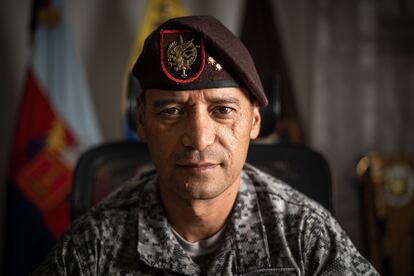
Q. What was your daily routine like?
A. I would wake up at 5 a.m., hoping that we would locate the missing children that day. At 8 a.m., I’d compile reports, review updates on the operation and come up with new ideas for our search. Every night, my son would ask if we found them, and I had to say no – it was heart-wrenching. But I never lost faith that we would find them the following day.
Q. Did you leave Bogotá to go to San José because the search was stalled?
A. During my visit there, I immersed myself into the operational and tactical details, making decisions and communicating information. I was worried that silence might fuel criticism, so I made sure we communicated everything about our troops’ well-being, logistics, intel and sustenance. Once we found some evidence [of the children], media coverage intensified, so I had to shield our troops on the ground from any distractions. Coordinating with the Indigenous people was essential, and added new demands to an already exhausting and challenging mission.
Q. What was the most difficult day?
A. May 18. That day, we received a report of a fresh footprint. We had found other footprints over the previous three days and I felt we were getting closer.We quickly mobilized all our resources, including helicopters, planes, and satellite imagery. “Tonight’s the night,” I said. We put troops on the ground in the area of the footprint, and I told them they couldn’t sleep, to keep going for the next 24 hours. Those 24 hours – those golden hours – would be critical to finding them. We brought recordings of their grandmother and played them over a megaphone. We tried everything and found nothing. I started wondering, “What’s happening here?” That’s when I decided to ask the mother jungle to return the children to us.
Q. Day 36 of the search was also tough.
A. Yes, Monday, June 5. I went to a local chapel in Bogotá seeking divine guidance. I prayed and read the Bible, but didn’t come away with any answers. I asked God for a sign, but then I realized that He simply wanted me to have faith and to take action. That’s when I decided to go to the jungle.
Q. What’s it like?
A. Beautiful, but hostile. Very tall trees, dense vegetation with dangerous animals like tigers and jaguars roaming around, venomous snakes, poisonous plants and mosquitoes with diseases that can kill you. Sometimes you can’t see the sun because the jungle is so dense, and sometimes it rains for 16 hours straight. It’s a place that can easily swallow you up if you’re careless.
Q. How many more days do you think the children could have survived under those conditions?
A. Tien, the 5-year-old boy, would have lasted only another three days. He was very weak. The baby, maybe a week.
Q. What about Lesly and Soleiny?
A. They were struggling, but holding on. They had been well-fed and were a little plump, which was critical for them.
Q. Is this the longest search in the history of Colombia?
A. No, there was another one, a search for a dead prosecutor who fell out of a military helicopter during an operation.
Q. Did it take longer to find the prosecutor’s body?
A. We never found him – that was back in 2014. But this was the first time combat-trained men were used for a search, equipped with satellite capabilities, aircraft and everything needed to find survivors. The Indigenous people could not have gotten to the search area alone and they couldn’t have sustained themselves for so long. We needed both elements to succeed.
Q. How have you personally been affected by all of this?
A. As a general, I feel like we fulfilled the mission. As a person, it affected me a lot. Every time I thought about the children, I was thinking about my own son. Every time I thought about their parents, I was thinking about my wife. That created a very strong connection. I did it out of conviction. I think what we do here saves lives every day, even during combat missions. We are protecting our country’s most vulnerable people, and our men give their lives for that. I don’t know if you saw the photo gallery downstairs?
Q. Yes.
A. It’s a good message for our country, one that can unite and help us move forward.
Sign up for our weekly newsletter to get more English-language news coverage from EL PAÍS USA Edition
